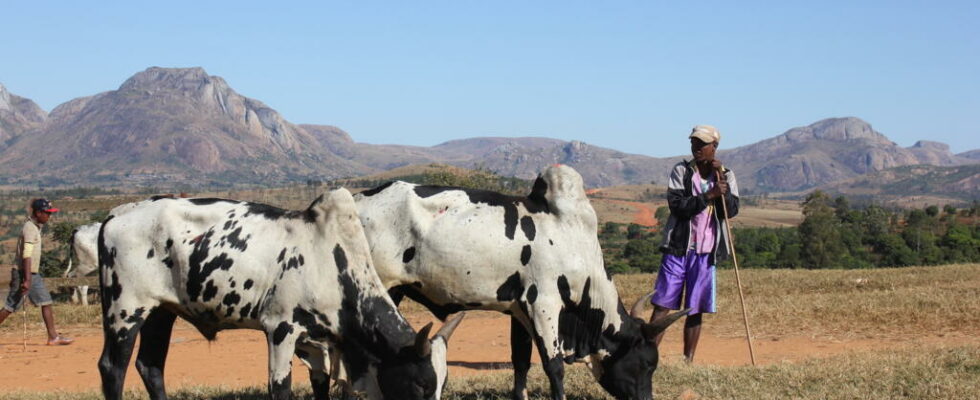In Madagascar, they are considered “large breeders”. With their herd of several hundred head of zebu, they participate in extensive breeding. These breeders graze their livestock on large areas of pasture across the island and contribute to the country’s economy. However, their activity remains little known and little taken into account in development projects, as well as in agricultural policies.
4 mins
With our correspondent in Antananarivo, Sarah Tétaud
Zebu breeders came to plead their case with the Ministry of Agriculture and Livestock during a recent trip in the capitalorganized by civil society and a group of researchers. “ We are happy, because we were able to expose our situation », Explains Simon Milavonjy, 68 years old, breeder from the Ihorombe region (south), at the head of the delegation.
“ Our suffering regarding extensive livestock farming is that we are neglected compared to those who practice agriculture (or intensive breeding of chickens or pigs). You see, when the State enters into a contract which concerns our land, with investors, foreign or local: we are not consulted. However, we help feed all the Malagasy people. »
Thanks to pasture grasses, intensive breeding allows the meat production. A food resource created on the territory which requires neither input nor plowing and which uses land which is very difficult to cultivate given its low agronomic quality. “ We want the breeding of zebu on pastures to be promoted,” insists François Fiankina, a breeder from Boeny, in the northwest of the island.
“ We are despised »
“ The problem is that those who write the laws do not know our realities. We are looked down upon because we have not studied. But we know our zebus and their needs “, he continues.
The septuagenarian from the rural town of Katsepy would like certain laws to be amended. Starting with those governing fires. “ We need to renew the pasture grass at the start of the rainy season, in November and December. But the law prohibits us from setting fire to pastures during this period and only authorizes us to do so in February-March. But it’s too late: it would burn the herbs that have already gone to seed. », deplores the breeder.
By explaining their practices and their needs to the central administration, breeders hope to remind everyone of their usefulness, historical significanceidentity and social aspects of extensive livestock farming and participate, in the future, in the development of future laws.
Also readMadagascar: at the Antsirabe zebu market, breeders promise a “distress vote” [3/5]
Include breeders in decision-making processes
Since 2022, researchers from the Center for International Cooperation in Agricultural Research for Development (CIRAD), specialized in land governance, agronomy and natural resource management, have been studying this livestock system in large pastures.
Recently, it is now the think tank called “Think Tany” which supervises these surveys and shares the results, both with breeders and with decision-makers and donors, to help shape better adapted laws and development projects. to local realities.
“ It is important to collect information on extensive cattle breeding and pastures, because the information available regarding these areas is not up to date and dates from the 1960s, 1970s and 1980s. So the fact of producing, to accumulate and share this knowledge with breeders should allow them to put in place advocacy so that they find their place in the decision-making processes », Indicates Oginot Germier Manasoa, coordinator of the think tank “Think Tany”.
“ We hope that they are heard and listened to »
“ In Madagascar, land laws allow people who cultivate a place for more than 5 years to be recognized as the owner, through a document called a land certificate. However, in the case of extensive breeders, the law does not recognize their activity as development. And that’s why, with the information we have collected, with our sharing with these breeders, we hope that they are heard, listened to and recognized as people who highlight their territory through extensive breeding. And also that they can be secure in their rights », he adds.
“ Currently, there is an ongoing bill on community land rights. And so, we are mobilizing so that we can recognize pastoral territories within this community land law bill. », concludes Oginot Germier Manasoa.
Also readMadagascar: the zebu hump
